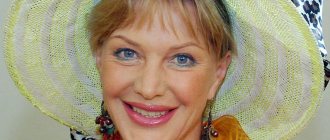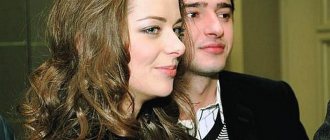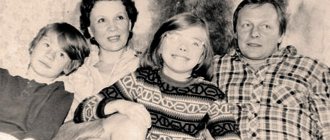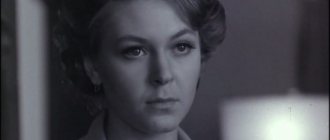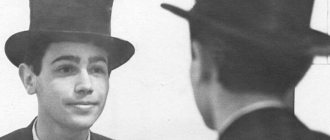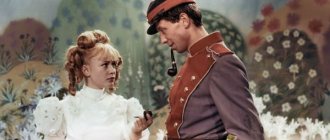Height, weight, age. How old is Elena Tsyplakova
Fans of all times always wanted to know what physical characteristics their favorite had, including height, weight, age. How old is Elena Tsyplakova? This is a question that people have been looking for answers to ever since the girl first appeared on the silver screen.
The aspiring actress was born back in 1958, she was already fifty-nine years old. The zodiac circle gave Elena the sign of a stable, vengeful, ambitious, passionate, fatal Scorpio.
At the same time, the eastern horoscope endowed the beauty with character traits characteristic of a Dog, namely, resourcefulness, devotion, smiling, a penchant for creativity and artistry.
Elena Tsyplakova: photos in her youth and now - these are women with completely different builds. The fact is that until the end of the eighties she was a slender and luxurious beauty, until she went with a delegation of Soviet directors to one of the African countries. After that, she became seriously ill, but with a disease that Soviet doctors were unable to diagnose and prescribe the correct treatment.
The reason for being admitted to the hospital was said to be severe malaria, which often led to death. Lena was operated on, but she began to rapidly gain weight, which had already increased from sixty-five to one hundred and twelve kilograms. The girl’s height is only one meter and sixty-seven centimeters.
Biography
Viewers saw the fragile, big-eyed girl Elena Tsyplakova on the screen in the 70s and immediately fell in love with her.
Moreover, the actress was charming both in the role of Katie in “D’Artagnan and the Three Musketeers,” where her head was adorned with lovely curls, and in the image of Agnia, shaved bald, in “Adult Son.” However, Tsyplakova in her youth and now are two different women. When an absurd accident seemed to put an end to such a successful acting career, Elena did not break down, but simply switched a certain switch in her head and sat down at the director’s console. The woman experienced problems with alcohol, but realized that she was doing things that were not pleasing to God. Faith changed the life of Tsyplakova, who now works spiritually on the set.
Biography of Elena Tsyplakova
The biography of Elena Tsyplakova was filled with tragic and magical events. Her father, Oktyabr Tsyplakov, and mother, Zoya Tsyplakova, were famous Soviet artists who worked in the graphic style. At the same time, dad fell ill with an open form of tuberculosis, so it was decided to send the six-year-old baby to a boarding school so that she would not become infected with the insidious disease.
Lenochka lived within the walls of the boarding school for about two years, but managed to begin to hate the cruel conditions of her stay there. She was a playful and funny girl, so her teachers often spanked her and placed her bare feet on the cold tiles to punish her.
The eight-year-old girl returned home, she went to school and entered several sports sections. Lenochka did swimming and gymnastics, pentathlon and figure skating. In the last grades of school, she wanted to connect her future life with sports or exact sciences.
Filmography: films starring Elena Tsyplakova
However, when Lena was barely fifteen, she made her debut in several films at once: “The Woodpecker Doesn’t Have a Headache”, “Ivan and Columbine”, “Widows”, “A Step Toward”, “The Non-Transferable Key”, “In the Zone of Special Attention” , "School Waltz". It was the director Dinara Asanova who advised the talented girl to enter GITIS.
After Tsyplakova became a student at the acting department, she continued to act in films, which caused her expulsion. Elena received a diploma from the acting and directing department of VGIK.
It is worth clarifying that since then, the actress’s filmography has been replenished with dozens of roles in films and TV series “Adam Marries Eve”, “We Are From Jazz”, “Guest from the Future”, “Midshipmen Go!”, “Children of the Sun”, “Family Secrets” ", "I see the goal", "Captive of deception", "Black cat", "Where is nophelet?"
In addition to acting in films, Elena is an actress at the Maly Theater and the Start creative association. She is the director of eleven works, including the famous and beloved TV series “Carmelita”, “While the village is sleeping”, “Alien Nest”.
Tsyplakova is the dean of the Faculty of Theater and Cinematography at the Natalia Nesterova Academy.
Elena Tsyplakova was born on November 13, 1958 in Leningrad into a creative family. Her parents were famous industrial graphic artists. From childhood, life tested Elena's strength: her father, Oktyabr Ivanovich, was seriously ill with tuberculosis, fearing that the disease could be passed on to her daughter, her parents sent the six-year-old girl to a boarding school. Elena has not the most pleasant memories of her stay in the boarding school. There were pathologically cruel people among the staff: for example, one of the nannies put the children barefoot on the cold tiled floor of the toilet for talking after lights out. Because of her independent character, Lena Tsyplakova was among those punished more than once. One day this nanny hit Lena in the face, and the resentment was so strong that the girl decided to hack her to death with an ax: “She hit me in the face. For lying. For someone else's. I was unconscious. They brought me to my senses. And I said to myself: I will hack this woman to death with an ax. And for a very long time I imagined – every free minute – how I would do it.” Later, she admits that the two years spent in a boarding school significantly complicated her relationship with her parents, especially with her mother, and the theme of the upbringing and life of children, their misunderstanding by adults, became one of the main ones in her work. However, with age, Elena became more and more close to her father, recognizing her similarities with him: “My father was a man of principle. Clear, specific, able to tell the truth. My father loved me very much, and when I grew up, I became his constant listener. Dad drank a glass and a monologue began for several hours. He had a philosophical mind. Despite all the complexities of his character, despite the fact that we argued and fought with him, he was an indisputable authority. We had a spiritual connection so powerful that much of my life can be attributed to his influence. I realized a long time ago how it resonates with me. It was thanks to my father that I seemed to be internally prepared for my future directorial works.” However, the two-year stay in the boarding school did not embitter the girl, but only strengthened her character and made her independent early. According to Elena, she had a mischievous character since childhood, and she hung out mainly with boys. Already in elementary school, her parents taught the girl to play sports: she did figure skating, swimming, and pentathlon. Despite the active life in the yard and playing sports, there were never any problems with school; Lena was especially easy in the exact sciences: mathematics, chemistry. It was with these items that the girl was going to connect her future profession, but did not even think about becoming an actress. However, in the 7th grade, chance brought Elena together with director Dinara Asanova, whose husband worked as a graphic artist and knew Lena’s parents. One day in 1973, Asanova and her husband found themselves in the Tsyplakovs’ house, where the talented director and a Leningrad schoolgirl met. When a year later Asanova began working on the film “The Woodpecker Doesn’t Have a Headache,” she remembered Lena and invited her to one of the main roles. The film was released in 1975, and in 1978 it was recognized as the best foreign film in Cuba. After the stunning success of the film, offers rained down on Tsyplakova. While still at school, Elena starred in the films “Ivan and Columbine” (dir. V. Chechunov, 1975), “A Step Towards” (dir. N. Birman, 1975), “Widows” (dir. S. Mikaelyan, 1976). Elena Tsyplakova’s collaboration with Dinara Asanova continued in the film “The Non-Transferable Key” (1977), where the actress also got the role of a schoolgirl. In essence, Tsyplakova played herself - a serious girl with adult problems, who looked at the world thoughtfully and intently. And it turned out that such a girl was needed not only by Asanova, but also by millions of viewers (the film was watched by more than 16 million people), and more generally by Soviet cinema, which was tired of the healthy optimism of the heroines of the 60s. The film was awarded numerous awards at international and all-Union festivals: at the All-Union Festival in Riga, at the festival in Moscow, in Yugoslavia, in Koszalin. Elena Oktyabrevna subsequently recalled with gratitude her work with Asanova: “I believe that she greatly influenced me. I was fourteen when we met, and we communicated closely for several years. Dinara gathered at her home the guys who were filming with her, we sat and talked about serious topics: what is love, betrayal, war... Dinara did not show us the script, and it seemed to us that we were inventing everything ourselves...” In 1979, Asanova and Tsyplakova met on the set of the film “Useless” - at that time Elena was already studying at VGIK, and there were about a dozen films in her filmography, but she happily accepted the offer of her “film godmother.” As N. Barabash writes: “She was immediately flooded with offers - and soon her charming heroines flashed on the screen: thin beasts with a coquettishly naive look, piercing black eyes. And the mole on her cheek simply drove men crazy. One word – talented cutie.” Unfortunately, the role of a “talented cutie” stuck tightly to Lena Tsyplakova, who wanted to play serious dramatic roles, and only Asanova saw her in them. After graduating from high school in 1976, Lena Tsyplakova went to Moscow to enter theater school - she firmly decided to become an actress, and even more than that, she was already an actress who was recognized on the street and to whom fans wrote letters. She failed the exams at the Shchepkin Theater School and the Moscow Art Theater School. The last one on her way was GITIS, where she entered. I rented an apartment in Moscow and lived for about six months on the money my parents sent me. And then, when offers to work in films came one after another, Elena was able to refuse parental help. Elena Tsyplakova gained all-Union fame for her leading role in Pavel Lyubimov’s film “School Waltz,” which was released in 1978. Tsyplakova played tenth-grader Zosya, who fell in love with her classmate and gave birth to a child with him (according to the actress herself, this is one of the few roles in her film career that is close to her in character). Meanwhile, after the release of the film, Tsyplakova’s student life became more complicated: theater teachers did not like the fact that she often acted in films (in 1977, Elena played in two more films, “Hate” (dir. S. Gasparov) and “In the Zone of Special Attention "(dir. A. Malyukov)), and they demanded that the student stop all filming during her studies. Tsyplakova refused: “At the institute, I hid my film past - they really don’t like it there. And she continued acting on the sly: she had to pay for the room and earn a living. And then, I understood that no relationship with teachers is worth my future fate. Because of my studies, I already had to refuse many roles. There were constant scandals; they simply wouldn’t let me go to “School Waltz.” They decided to make me an illustrative example of how cinema negatively affects a student at a theater institute. Once, when I asked one of my teachers what his direction consisted of (what he suggested seemed nonsense to me), I received the answer: “You see, Lena, mediocrity is such a thing, it makes those who are nearby - and partners - mediocre. , and the director." After that, I left, and they shouted after me that this was unsuitable for my profession. The guys on the course turned away from me. I went for a walk around Moscow and wandered the streets for three days. A guy from the director’s office found me and told me to immediately go to college. They asked why I wasn’t in class. “I realized that you don’t need me anymore.” “Well, why,” they answered me, “we have no one to open and close the curtain at rehearsals and run-throughs.” I did a great job with the curtain...” After this story, Tsyplakova moved to VGIK, on the course of L. Kulidzhanov and T. Lioznova. However, studying at VGIK was not easy for Elena. In parallel with her studies, Tsyplakova began working at the Maly Theater, and film teachers did not like this. Elena's independence, her reluctance to play by established rules and her desire to go against stereotypes even then caused bewilderment among others. In 1979, a three-part film by G. Yungvald-Khilkevich “D'Artagnan and the Three Musketeers” was released, in which Tsyplakova played the role of Katie. Despite the huge success of the film among the audience, the actress remained dissatisfied with her work: “I have never played in a musical comedy before. And I've never been to the south. And so, when I arrived at the seaside, I didn’t even approach him. Everyone was roasting on the beach, and I was endlessly rehearsing the song “St. Catherine.” And when I came to the sea for filming, they told me: “You don’t need any dancing, just jump to the music.” I almost burst into tears... Besides, it seemed to me that I had monstrously overacted. In a word, I left Odessa in tears.” In the same year, two significant events occurred in Elena’s life: she got married (although the marriage lasted no more than a year) and graduated from VGIK. Life was getting better: the actress managed to combine successful work in the theater (Anya in The Cherry Orchard, Lisa in Woe from Wit, Okayemova in Handsome Man) with a dizzying film career. Between 1979 and 1980, Tsyplakova starred in seven films: “Karl Marx. Young Years" (dir. L. Kulidzhanov), "Adult Son" (dir. A. Pankratov-Cherny), "The Adventures of Prince Florizel" (dir. E. Tatarsky), "Adam Marries Eve", "The Key" (dir. A. Korenev), “The Collapse of Operation Terror” (dir. A. Bobrovsky), “Faster than one’s own shadow” (dir. P. Lyubimov). Elena happily took on the job, because every role for her is a challenge, an uncharted territory: “I love heroines who are strong, active, capable of taking decisive actions and being responsible for them. For me, it is not so important in what era these heroines live, in what genre the play or script was written. Another thing is much more important: that the character has an ambiguous, dynamically developing character.” In 1981, Tsyplakova left the Maly Theater to work under contracts. In the same year, Elena Oktyabrevna entered the directing department of VGIK (workshop of A. Alov and V. Naumov). The sought-after young actress explained her decision to become a director as follows: “For me, the process of growing, educating myself is connected precisely with work. Reruns began in the cinema - after “School Waltz” I played several more proud single mothers. I am very grateful to the theater, but the performances I was introduced to were old, and I couldn’t count on any special search. I felt that if I continued to live like this, I would begin to “deteriorate.” For three years, the aspiring director studied full-time, played in the theater and actively acted in film. She slept four hours a day. In 1984, before defending her thesis, Elena made her final choice and left the theater forever. This decision caused irony among many people professionally associated with theater and cinema, because Elena was perceived by her film roles - Katie from “The Musketeers” and Katya Bobrova from the film “We are from Jazz” (dir. K. Shakhnazarov, 1984). In the same year, Tsyplakova remarried - to dentist Sergei Lipets, who was twenty years older than her. The period from 1985 to 1989 cannot be called the happiest in the life of Elena Tsyplakova, both creatively and personally. After graduating from the directing department, for a long time she could not achieve her own production - having two diplomas, she worked as an assistant director at Mosfilm. She appeared in few films: “Happy, Zhenya” (dir. A. Pankratov, 1985), “Personal Interest” (1987), “Midshipmen, forward!” (dir. S. Druzhinina, 1987), “Where is the nophelet?” (dir. G. Bezhanov, 1988). The latter circumstance was largely explained by the fact that Tsyplakova suffered a serious illness and gained a lot of weight. According to Elena Oktyabrevna: “I brought deadly malaria from Africa. Doctors could not make a diagnosis for a long time, then I underwent surgery and almost died. I had a moment of terrible despair. I didn’t want to live or work. And then I read the phrase: it is not possible to know what is for our benefit and what is for our harm. Shocks make a person deeper, make a person more appreciative of life and the time that is allotted to him.” Faith helped Tsyplakova find herself: “Living faith is not only in the performance of rituals, but in the inner content of a person. In his lifestyle. I was very lucky. I have a teacher, mentor - Sofia, with whom I have been in close contact for eight years. For me, meeting her was healing.” In addition, after her directorial debut in the film “Citizen Runaway” (1988), Elena Oktyabrevna drew the attention of Karen Shakhnazarov, who invited her to his creative association “Start”. It was there in 1989 that E. Tsyplakova shot her first serious film, “Reed Paradise.” The story about an underground camp for homeless people was told to screenwriters Ageev and Beloshnikov by a policeman in Kazakhstan, and they, shocked by what was happening in a small town, immediately sat down to write the script. The script proposal accidentally came to Tsyplakova, and she, without even reading the script to the end, firmly decided that she had to film it: “It’s not only bastards who are in prison. A fatal accident happens, and the most incredible thing can happen to anyone: “Don’t swear off prison or pocket money.” But the man stumbles, and they trample him and finish him off. And not everyone is ready to defend their lives. I wanted to talk about these unfortunate people, whose fate at some point got stuck. I wanted to make a film about self-esteem.” The tough, uncompromising socio-psychological drama caused bewilderment among many experts: how could a woman film this? Meanwhile, during the filming of the film, one characteristic episode occurred: one of the actors needed to eat several cigarettes. But he couldn't bring himself to do it. Then Elena Oktyabrevna herself realized the director’s task - she began chewing a cigarette. “Reed Paradise” won a prize for directing at the San Sebastian International Film Festival (1990). Thus, Elena Tsyplakova proved to others her right to this “unfeminine profession.” In 1992, E. Tsyplakova’s second directorial work was released - the film “I Trust in You.” And again, it was a psychological drama, which was based on the memories and images of Elena Oktyabrevna’s own boarding school childhood. The film told about the fate of a woman who, having abandoned her newborn child, in order to atone for her sin, got a job as a nanny in an orphanage: “I visited dozens of orphanages. I didn’t want to sculpt ordinary black stuff, just like I didn’t want to create romantic horrors in the spirit of Dickens. We tried to soften everything that was possible, so that the main thing would sound even more terrible. Please note: we do not write “You”, but “thee”, with a small letter. There are so many who rely not only on the Lord, but also specifically - on you, on me, on father and mother, on the first person you meet - because without help a person cannot survive. Even more so for a little person.” To reproaches about the cruelty of her films, Tsyplakova responds: “They say that my films are cruel. But I don't agree. They are about the cruelty of life, but if in them a person defends his dignity or tries to restore himself spiritually - what kind of cruelty is that?” At the melodrama film festival in Magnitogorsk in 1994, Tsyplakova’s film “I Trust in You” was awarded a prize. In 2001, Elena Oktyabrevna tried herself in the genre of a TV series, since it turned out to be impossible to find funding for a serious independent project. She approached work on the series very earnestly and responsibly: she asked for the blessing of her spiritual mentor Sophia, and every day began with prayer on the set. All the situations played by the actors were understood from the perspective of Christian commandments and moral laws. As E. Tsyplakova herself said: “For me, the most important thing that can be achieved through cinema is to evoke a feeling of repentance in a person.” Most recently, E. Tsyplakova completed a six-episode film for children, “Striped Summer”: “It’s about how kids come to a sports camp run by a retired military man. Children learn to ride horses, climb ropes, swim... And most importantly, they save the forest from poachers, stop the bulldozer that destroys everything. That is, they grow as individuals. Spiritual growth is a lot of work. And not only the child himself, but also those who raise him.” Elena Oktyabrevna almost never appears in films. Over the past 8 years, she has played in 3 films: in “Family Secrets” (healer Sophia), in N. Dostal’s “Cops and Thieves” (policeman’s wife), and in V. Pendrakovsky’s film “To whom I owe, I forgive everyone” ( banker). There is one more work - in the historical series by Bulat Mansurov “Warm Winds of the Ancient Bulgars”, where Tsyplakova plays Slava, the wife of Dobrynya Nikitich. However, when the film will be released is unknown. Several years ago, Elena Tsyplakova divorced her second husband, Sergei Maksimovich, and in the summer of 2005 she married for the third time. “I believe that a person should look for a solution to all his problems within himself. If everyone asked the question “why can’t I do it?”, and not “why does he succeed, but they don’t give it to me?”, society would avoid many troubles. There is a sin of self-justification, all people have sinned with this since the time of Adam and Eve. But the individual always faces a choice of what to do. And by choosing, we create our destiny. What we deserve is what we get.” Author - Marusya Materials used: rusactors.ru ru.wikipedia.org
Personal life of Elena Tsyplakova
Elena Tsyplakova’s personal life was surprisingly stable, since the beautiful and gentle woman never had stormy romances. Although her hobbies included Dmitry Kharatyan, Mikhail Boyarsky, Valery Priemykhov, Vitaly Solomin, Andron Konchalovsky.
The girl got married three times, and her husbands were associated with the world of theater and cinema, and also had absolutely nothing to do with creativity. The woman clarified that the marriages broke up one after another for various reasons.
Elena Tsyplakova says that she does not suffer at all from rapid weight gain, because she is incredibly happily married, loved and madly in love with her husband.
Personal life
Elena Tsyplakova's first marriage was early. She married her colleague Gennady. He also served at the Maly Theater then. It was a student marriage, which was registered in Riga. Boris Galkin and Irina Pechernikova agreed to become witnesses. But the couple soon realized that their life together was a mistake. Divorce followed less than a year after registration.
At this time, Elena became the lady of the heart of Vitaly Solomin. Tsyplakova herself put an end to the romance when she learned that her colleague at the Maly Theater would soon have a second child.
The personal life of Elena Tsyplakova changed in 1984. The young woman met a man far from the world of art. Dentist Sergei Lipets turned out to be 20 years older than the actress, but this did not interfere with the couple’s happy life.
In the mid-1980s, when Elena fell ill (after undergoing surgery to remove appendicitis, she began to rapidly gain weight, and the doctors pronounced it impossible to have children), her husband looked after and supported her in every possible way.
Then another blow happened - after a trip to Africa with a film delegation, the actress fell ill with malaria, and in the most severe form. The treatment almost killed Elena. She gained weight to 112 kg. Probably, the trials experienced shook this strong marriage, and it collapsed.
In 2005, Tsyplakova’s personal life improved. She married a man named Pavel Shcherbakov. The husband has nothing to do with the world of art, but brought the couple together by chance - Pavel gave the actress a ride to work. After 6 months, the lovers got married, 3 years later they got married in the Moscow Church of Peter and Paul.
Pavel has a daughter from a previous marriage, Julia, in whom the actress and director dotes. In addition, Elena more than once became the godmother of her colleagues, friends and relatives. Among these is actor Yegor Beroev. Later, Tsyplakova introduced him to the priest who married the artist to Ksenia Alferova.
Elena Oktyabrevna does not use social networks, but finding a photo of the People's Artist of Russia on the Internet is not difficult.
Family of Elena Tsyplakova
Elena Tsyplakova's family often went through difficult times, she was never friendly, and the baby did not feel parental love and support. After her father fell ill with tuberculosis, the girl ended up in an orphanage, so she regarded the placement in terrible conditions as a real betrayal on the part of her closest and dearest people.
Young Elena had a particularly difficult relationship with her mother, because the girl did not understand why she could not protect her from the teachers and nannies who bullied her.
By the way, Tsyplakova always considered Dinara Asanova to be her closest and dearest person, who sincerely worried about her.
Children of Elena Tsyplakova
Elena Tsyplakova's children were never born, although Lena often said that she would really like to become a mother. The exact cause of this phenomenon was never clarified, so various versions were put forward.
Evil tongues said that both Tsyplakova’s husbands did not want children, and then it was too late to have heirs. A version was put forward about Elena's infertility, which was the result of suffering from fatal malaria or unsuccessful removal of appendicitis.
One way or another, Tsyplakova herself never talked about why she doesn’t have children, referring to the will of God.
Elena Tsyplakova's ex-husband - Gennady
Elena Tsyplakova’s ex-husband, Gennady, is a dark horse in the life of the actress and director. Apart from his name, nothing is known about him, and there is also no information about the surname of the beauty’s first husband.
It is clear that the marriage was hasty, since the girl only recently graduated from VGIK and joined the Maly Theater troupe. It was there that she met a guy who was a graduate of the prestigious Sliver.
It is known that Gennady and Elena got married on tour in Riga, and the famous and beloved Irina Pechernikova and Boris Galkin were witnesses at their wedding. This marriage lasted exactly a year, and, as they say, the family boat crashed into everyday life.
Movies
A year after the release of Asanova’s film, Elena Tsyplakova starred in the film “A Step Toward.” Then there were two more films - “Widows” and “Ivan and Columbine”.
Viewers saw all of these projects in the mid-1970s. At this time, the young actress was still a high school student. The final film before entering GITIS was Dinara Asanova’s film “The Key Without the Right of Transfer.” Tsyplakova again played a schoolgirl, and very similar to herself - thoughtful and serious, looking at the world with adult eyes.
Elena Tsyplakova entered the capital's GITIS on her first attempt. With her track record, it was a piece of cake. But it was difficult to study. The girl continued filming. The audience enjoyed watching Pavel Lyubimov’s melodrama “School Waltz”.
The heroine of Elena Zosya Knushevitskaya is very similar to the actress: the same independent and uncompromising character, the same stubbornness and reluctance to follow generally accepted standards of behavior.
Then two more bright films appeared with the participation of Tsyplakova - “In the Zone of Special Attention” and “Hate”. The teachers were dissatisfied with the student’s vigorous acting activity. Relations with them became increasingly tense. Elena decided to move to VGIK, but it turned out to be no easier there either. The actress appeared on the stage of the Maly Theater, thereby violating the rules of the university.
In 1979, the adventure film “D'Artagnan and the Three Musketeers” was released. Tsyplakova, already famous, woke up incredibly famous. Although she herself did not like the role of Katie. A frivolous cutie is not at all the role of this actress prone to dramatic roles.
Unfortunately, the directors, who saw Katie in Tsyplakova, clung to this image and began offering the actress similar roles. Only Dinara Asanova, Elena’s “godmother” in the world of cinema, offered her a worthy role in her film “Useless.”
At the very beginning of the 1980s, Elena Tsyplakova, who had already played dozens of roles, entered VGIK. But this time - to the directing department. She wanted to make films herself, serious and with deep meaning, influencing human actions. Having received a diploma as a director, Tsyplakova did not immediately start making films. It was an extremely difficult period in her life. After suffering an illness, the actress recovered greatly. And she, having changed beyond recognition, was no longer offered roles. The audience remembered the characters of the former Elena from the musical comedy by Karen Shakhnazarov “We are from Jazz”, the single mother from the melodrama “Happy, Zhenya!”, Empress Elizabeth from the first part of the story about!
Tsyplakova's directorial debut took place in 1988. The film “Citizen Fleeing” was released. The debut turned out to be more than successful. Many eminent directors recognized Elena Tsyplakova as a colleague. Karen Shakhnazarov invited her to his creative association “Start”.
The following year, inspired by the success, Tsyplakova filmed her second project - the film “Reed Paradise”. After watching it, many colleagues and film critics expressed surprise that the director of this project was a woman. “Reed Paradise” received a prestigious prize at a festival in San Sebastian, Spain.
In 1992, another psychological drama by the director was released. This is the painting “I Trust in You”, it is about how a person in difficult life circumstances strives to regain his dignity. After the release of the film, some viewers and critics reproached Elena Tsyplakova for the excessive cruelty shown on the screen.
In the new century, viewers and fans of Elena Oktyabrevna enjoyed watching new projects. The first multi-part film directed by Tsyplakova was “Family Secrets” about a terminally ill banker whose children begin a war for inheritance. Then the series “Striped Summer” and “Carmelita” appeared. Gypsy passion."
Elena doesn’t mind filming “soap.” The actress and director, on the contrary, believes that the series is a way of dialogue with millions, while a 1-3-episode film will be seen by hundreds of thousands. Perhaps they will learn a lesson for themselves. Proof of this is the story of a lawyer friend who, after the release of “Secrets” on the screen, noticed that the number of divorce cases related to the division of property had decreased.
In addition, the series serves as a measure of the resilience of the creators. After 100 or 200 episodes, the authors will probably want to simplify both the picture and the dialogue. For Tsyplakova, such moves are unacceptable. “Intelligent conversations of heroes will teach people to speak normally.”
In 2014, viewers saw the series “While the village is sleeping,” a joint project by Tsyplakova and her two colleagues, Beta Nedich and Alexander Mokhov.
Elena considered the picture unique, if only because the characters constantly found themselves in situations in which the viewer, most likely, would never find themselves. From the director’s position, and also from the human one, it is interesting to know how people in reality would solve such problems when sin simply takes over the soul.
Shortly before taking the chair behind the camera, Tsyplakova appeared in front of her in the image of the head of a girls' sniper school in Yevgeny Sokurov's war drama “I See the Target.” The role of Colonel Aldonina brought the artist the prize of the military-patriotic film festival and the Golden Sword award.
Elena Tsyplakova's ex-husband - Sergei Lipets
Elena Tsyplakova's ex-husband, Sergei Lipets, appeared in the woman's life in 1983, who decided that the problems of her previous marriage were trivial - constantly being together at rehearsals and tours, at home and at work. The couple simply managed to get bored and bored with each other.
That is why Elena’s second husband had nothing to do with the world of theater or cinema. Sergei Maksimovich worked as a dentist in a regular clinic; he was about twenty years older than his chosen one.
The young people got married in 1984, but the marriage broke up when twenty years had passed.
Elena Tsyplakova's husband - Pavel Shcherbakov
Elena Tsyplakova’s husband, Pavel Shcherbakov, began living with her in an official marriage since 2005. The man has nothing to do with the world of theater and cinema, however, what he does is unknown.
Journalists found out that Pavel was married and has a daughter, Yulia, who lives with his first wife. She sometimes comes to her father, and Elena has friendly relations with her.
Pavel and Elena got married, and the man often makes fun of his beloved wife, since he was a fan of the actress, but failed to recognize her. The couple is happy together and never plans to separate.
Commandments of Healing
– I read that you contracted malaria in Africa. What helped you recover?
“The doctors couldn’t diagnose me for a long time. The consequences were severe. They even wanted to put me on hormones, but I said: “No, I will pray that the Lord will heal me.” I went through a very serious path of repentance, changed my lifestyle, and all my illnesses went away without medication. Many people cannot accept healing without drugs because they simply lack faith. The word “healing” itself comes from the word “whole”, “integral”, that is, it implies a combination of the spiritual and physical. And faith is not words, it is a way of life.
– After your illness, you weighed 106 kg. How did you manage to lose weight?
– Excessive fatness can have various physical reasons. But they can also be of a spiritual nature. Damage was brought upon me. To death. It didn’t work right away, but when I once got angry with this person. Damage generally affects us only when we are angry, irritated, offended; at this moment we are defenseless. But you need to pray for your ill-wisher, because he is spiritually sick. If you pray with love, this is the best protection. My friend, healer Vitaly Voskoboynikov, helped me; he poured water, and I drank it. But, of course, the prayer was not “about losing weight,” but about “cleansing from all negativity.” As a result, in three months I lost 25 kg without any diets. And now I’m already minus 33 kg. – As far as I know, you also help others heal?
– I helped myself and read a lot. And when something is revealed to me, I want to share it with everyone. People apparently sensed this and began to come to me with similar problems. I simply told them about my experience, helped them understand the root cause, and prayed with them. So, one of my colleagues told me that he felt very bad, he was waiting for an ambulance: the stone had gone, the pain was hellish. He and I found out that the reason was his too zealous attitude to work, we prayed together, and... There was no need for an ambulance; the stone came out without any difficulty.
It is very important to me that I was able to help my mother. I came to see her at the hospital when they removed a tumor in her intestine, and together with my husband we laid hands and prayed. Vitaly Voskoboynikov also prayed with us - from a distance. We begged my mother: her liver metastases completely disappeared. The attending physician was very surprised when he saw the results of the tomogram: there were no cancer cells! To people who live only at the level of natural needs, this seems like miracles. But the Lord said: “He who believes in me will do the same as I do, and more.”
Photo by Elena Tsyplakova in Maxim magazine
A photo of Elena Tsyplakova never appeared in Maxim magazine, since the director was never photographed naked for the cover or spread of this men's publication.
Everyone has long known that posting explicit photos of a famous actress in magazines and newspapers in Soviet times was considered the highest measure of vulgarity and indecency. That is why Elena starred naked in only four films, namely, “The Woodpecker Doesn’t Have a Headache,” “What Are Our Years,” “The Picture,” “Happy, Zhenka!” At the same time, these shots looked very chaste, organic and beautiful.
Elena Tsyplakova in an open and closed swimsuit starred in a number of films, including “Sons of Bitches.” There are also photos and videos in this form from the sea coast where the beauty was vacationing.
Childhood and youth
Elena Oktyabrevna Tsyplakova was born in November 1958 in Leningrad. The girl grew up in a family of creative people - her parents were graphic artists. The childhood of the future actress was overshadowed by non-childhood problems.
For some time, Tsyplakova was forced to live and study in a boarding school because her father was diagnosed with an open form of tuberculosis. These years were difficult - the girl turned out to have a rather stubborn, boyish character. She was repeatedly punished for pranks.
When Elena returned home, life got better. The girl was an excellent student (she especially liked mathematics) and was fond of sports. One day, a family friend, artist Nikolai Yudin, looked into their noisy and cheerful house. And with him came his wife, a graduate of a theater university, Dinara Asanova. She saw an artist in the nimble girl. Thus began the cinematic biography of Elena Tsyplakova.
The 15-year-old girl starred in her first film, “The Woodpecker Has a Headache,” which was released in 1974. The image of the first beauty in Irina Fedorova’s class brought fame to the young actress. The directors bombarded the young talent with new proposals. Tsyplakova gladly accepted them, but at the same time managed to do well at school.
Instagram and Wikipedia Elena Tsyplakova
Instagram and Wikipedia of Elena Tsyplakova exist in official form, but only half. The fact is that the famous actress does not have profiles on social networks such as Odnoklassniki and Instagram. At the same time, you can find numerous fan groups that post photos and videos on behalf of Elena Oktyabrevna, but are not responsible for the accuracy of the information.
The article dedicated to Tsyplakova on Wikipedia contains a huge amount of reliable and relevant information that is devoted to childhood, hobbies, parents, education, filmography, directorial and theatrical works, as well as personal and family life.

